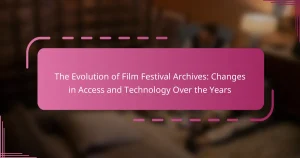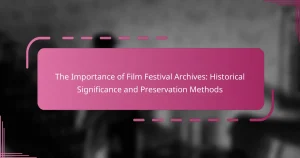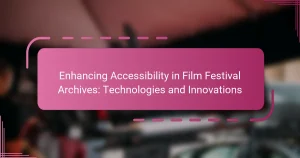Film festival archives are essential collections that preserve materials related to film festivals, including film screenings, promotional content, and event documentation. These archives maintain a historical record of showcased films and filmmakers while serving as valuable resources for research, education, and networking within the independent filmmaking community. They promote diverse cinematic works, foster a sense of community, and enhance visibility for filmmakers. Best practices for utilizing these archives involve thorough research, engagement with archival staff, and awareness of legal considerations. By documenting the evolution of independent cinema, film festival archives support emerging filmmakers and inspire innovation in the industry.

What are Film Festival Archives and Their Purpose?
Film festival archives are collections that preserve materials related to film festivals. These materials include film screenings, promotional materials, and documentation of festival events. Their purpose is to maintain a historical record of the films and filmmakers showcased. Archives also provide resources for research and education about film history and culture. They support independent filmmakers by offering access to past films and industry insights. Additionally, archives often facilitate networking opportunities for filmmakers and industry professionals. By preserving these materials, film festival archives contribute to the cultural heritage of cinema.
How do Film Festival Archives support independent filmmakers?
Film festival archives support independent filmmakers by preserving their work and providing access to audiences. These archives catalog films submitted to festivals, ensuring they are accessible for future screenings and research. They often offer resources such as distribution opportunities and networking events. Many archives collaborate with filmmakers to promote their films through various platforms. This support can lead to increased visibility and potential funding for future projects. Additionally, archives may host workshops and seminars that educate filmmakers on industry trends. Research shows that filmmakers who engage with archives often benefit from enhanced career prospects.
What types of resources can filmmakers find in these archives?
Filmmakers can find various resources in film festival archives. These resources include historical films and documentaries. They also provide access to scripts and screenplays. Additionally, filmmakers can find production notes and behind-the-scenes materials. Archival footage and photographs are often available as well. Many archives offer educational materials and workshops for filmmakers. Filmmakers can also access industry reports and analysis. These resources support the creative process and enhance filmmaking knowledge.
How do archives preserve the history of independent cinema?
Archives preserve the history of independent cinema by collecting, cataloging, and maintaining films, documents, and artifacts. They provide a structured environment for the storage of film materials. This includes original prints, scripts, promotional materials, and filmmaker interviews. By digitizing these materials, archives make them accessible to researchers and the public. They also facilitate preservation efforts to prevent decay and loss of films. Many archives host screenings and events to promote independent cinema. This helps raise awareness and appreciation for the genre. Notable examples include the American Film Institute and the British Film Institute, which actively preserve and promote independent films.
What opportunities do Film Festival Archives provide?
Film Festival Archives provide opportunities for research and education. They serve as valuable resources for filmmakers, historians, and scholars. Archives preserve unique films and documents that reflect cultural history. They offer access to rare footage and materials that may not be available elsewhere. Film Festival Archives also facilitate networking opportunities among filmmakers. They help connect emerging talents with industry professionals. Additionally, they provide platforms for showcasing independent films. This exposure can lead to distribution deals and increased visibility for filmmakers.
How can filmmakers leverage archives for networking and collaboration?
Filmmakers can leverage archives for networking and collaboration by accessing historical footage and resources. These archives often contain valuable materials that can enhance storytelling. Filmmakers can connect with other professionals through shared interests in specific archival content. They can also attend events organized around these archives, fostering relationships with industry peers. Collaborations can arise from discovering mutual projects or themes within the archived materials. Additionally, filmmakers may find mentorship opportunities through archival organizations. Networking through archives can lead to partnerships for future projects or funding opportunities. Ultimately, engaging with archives expands a filmmaker’s professional network and collaborative potential.
What funding opportunities are available through film festival archives?
Film festival archives provide various funding opportunities for independent filmmakers. Many archives offer grants specifically designed to support film projects. These grants may cover production, post-production, or distribution costs. Additionally, some festivals have specific funds aimed at promoting underrepresented voices in cinema. Filmmakers can also access funding through partnerships that festivals establish with local arts organizations. Some archives provide resources for crowdfunding campaigns, enhancing financial support options. Furthermore, festivals often host pitch competitions with cash prizes for innovative projects. These funding avenues are crucial for independent filmmakers seeking to bring their visions to life.

How do Film Festival Archives Impact the Independent Filmmaking Community?
Film festival archives significantly impact the independent filmmaking community by preserving and promoting diverse cinematic works. They provide a platform for filmmakers to showcase their films, increasing visibility and access. Archives often include a range of genres and styles, reflecting the creativity within the independent sector. This diversity helps foster a sense of community among filmmakers and audiences. Additionally, archives serve as educational resources, offering insights into filmmaking techniques and industry trends. They can also facilitate networking opportunities, connecting filmmakers with industry professionals and potential collaborators. Studies show that access to archived films can inspire new projects and innovation within the independent film sector. By documenting the evolution of independent cinema, film festival archives ensure that emerging filmmakers have a rich history to draw upon.
In what ways do archives enhance visibility for independent films?
Archives enhance visibility for independent films by preserving and showcasing their work. They provide a platform for filmmakers to reach wider audiences. Archives often organize screenings and exhibitions, highlighting unique films. They also maintain catalogs that document film history and accessibility. Many archives collaborate with film festivals to promote independent cinema. This partnership increases exposure and opportunities for distribution. Additionally, archives can facilitate educational programs that introduce independent films to new viewers. By offering resources for research and study, they contribute to the ongoing appreciation of independent filmmaking.
How do archives contribute to the promotion of diverse voices in film?
Archives contribute to the promotion of diverse voices in film by preserving and showcasing underrepresented works. They provide access to films that may not receive mainstream attention. This accessibility allows filmmakers from various backgrounds to reach wider audiences. Archives also facilitate research and education about diverse cinematic narratives. By documenting the histories of marginalized communities, they help to validate their stories. Furthermore, collaborations with filmmakers can lead to new projects that highlight these voices. Archival programs often include initiatives aimed at increasing visibility for minority filmmakers. Overall, archives play a crucial role in fostering inclusivity within the film industry.
What role do archives play in film education and research?
Archives play a crucial role in film education and research. They provide access to primary source materials, such as scripts, production notes, and historical films. These resources enable students and researchers to study filmmaking techniques and industry practices. Archives also preserve cultural heritage by safeguarding films that reflect societal values and historical contexts. For instance, the Library of Congress houses over 1.3 million films, making it a vital resource for film scholars. Additionally, archives often offer educational programs and workshops, enhancing learning opportunities. They facilitate collaboration between filmmakers and researchers, fostering innovation in the field. Overall, archives are essential for understanding the evolution of cinema and its impact on society.
What challenges do independent filmmakers face regarding Film Festival Archives?
Independent filmmakers face several challenges regarding Film Festival Archives. Limited access to archival materials can hinder their research and development. Many archives have restrictive policies that make it difficult to obtain necessary footage. Furthermore, the preservation of independent films is often inadequate. This leads to potential loss of valuable cultural content. Independent filmmakers may also struggle with the costs associated with accessing archives. Additionally, there is often a lack of awareness about available resources. The competition for visibility in festival archives can overshadow independent works. These challenges collectively impact the ability of independent filmmakers to utilize archives effectively.
How can filmmakers overcome barriers to accessing these archives?
Filmmakers can overcome barriers to accessing archives by utilizing networking opportunities and leveraging technology. Building relationships with archivists and attending film festivals can facilitate access. Filmmakers should also engage with online platforms that provide digital access to archives. Many archives offer virtual tours or online databases, making it easier to find resources. Additionally, applying for grants or funding specific to archival research can help filmmakers cover costs associated with accessing materials. Collaborating with other filmmakers or institutions can create shared access to resources. Understanding the specific requirements and policies of each archive is crucial for successful navigation.
What are the limitations of Film Festival Archives in supporting filmmakers?
Film festival archives have several limitations in supporting filmmakers. One major limitation is accessibility; many archives are not easily reachable for filmmakers. This can hinder their ability to utilize available resources. Additionally, archives may have restrictive usage policies. These policies can limit how filmmakers can access or use archived materials.
Another limitation is the lack of comprehensive collections. Some archives do not house a wide variety of films, which reduces the diversity of resources. Furthermore, archives may not provide adequate promotion for the films they store. This can lead to underexposure of filmmakers’ works.
Finally, funding constraints often affect the operations of film festival archives. Limited budgets can restrict the services they offer to filmmakers. These factors collectively create challenges for filmmakers seeking support through film festival archives.

What are Best Practices for Utilizing Film Festival Archives?
Best practices for utilizing film festival archives include thorough research of available materials. Filmmakers should identify specific archives relevant to their projects. Accessing digital and physical collections can yield valuable insights. Engaging with archival staff enhances understanding of the resources. Filmmakers should also consider the legal aspects of using archived content. Citing sources accurately is crucial for credibility. Networking with other filmmakers can provide additional context and support. Utilizing these practices can maximize the benefits of film festival archives for independent filmmakers.
How can filmmakers effectively navigate Film Festival Archives?
Filmmakers can effectively navigate Film Festival Archives by utilizing online databases and search tools. These platforms often categorize films by genre, year, and festival, simplifying the search process. Filmmakers should also familiarize themselves with the specific archive’s layout and available resources. Many archives provide guides or tutorials to assist users in finding relevant films. Networking with festival staff or other filmmakers can yield valuable insights into navigating these archives. Additionally, attending workshops or panels at festivals can enhance understanding of archive utilization. Access to archived films can inform filmmakers about industry trends and successful storytelling techniques.
What strategies can be employed to maximize the benefits of archives?
Utilizing archives effectively requires strategic approaches. First, digitization of materials enhances accessibility for independent filmmakers. It allows for easier search and retrieval of relevant content. Second, establishing partnerships with film schools can facilitate knowledge sharing. Collaborations can lead to workshops and training sessions. Third, promoting archives through social media increases visibility. Engaging content can attract filmmakers to utilize available resources. Fourth, organizing themed screenings can showcase archived films. This can stimulate discussions and inspire new projects. Finally, providing clear guidelines for usage rights encourages filmmakers to engage with the archives. These strategies collectively maximize the benefits of archives for independent filmmakers.
What tips can independent filmmakers follow to engage with Film Festival Archives?
Independent filmmakers can engage with Film Festival Archives by researching the festivals that align with their film’s genre and themes. They should familiarize themselves with the submission guidelines and deadlines of these festivals. Networking with festival organizers and other filmmakers at events can provide valuable insights. Filmmakers should also attend screenings and panel discussions to learn about the industry. Utilizing social media to connect with festival curators can enhance visibility. Lastly, filmmakers can archive their work in these archives to preserve their films for future audiences. Engaging actively with these strategies can increase a filmmaker’s chances of success within the festival circuit.
Film festival archives are essential collections that preserve materials related to film festivals, including screenings, promotional materials, and documentation of events. They serve multiple purposes, such as maintaining a historical record of films and filmmakers, supporting independent filmmakers through access to resources and networking opportunities, and enhancing film education and research. The article explores how these archives impact the independent filmmaking community by promoting diverse voices, providing funding opportunities, and facilitating collaboration. Additionally, it outlines best practices for filmmakers to effectively navigate and utilize these archives to maximize their benefits.


